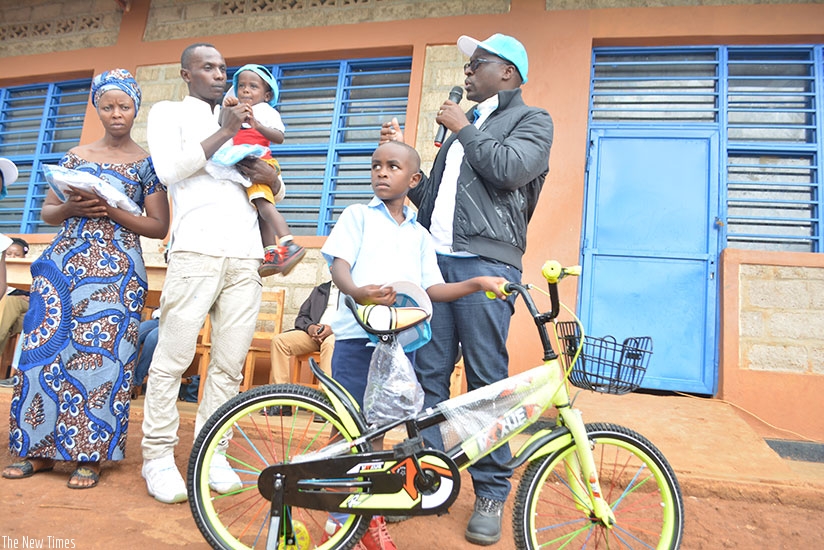The look on Yasiri Rukundo’s face says it all. The fruits of his actions were dazzling and it took him a long but frozen moment of time to sink in his young but sharp mind. The colored yellow and red bicycle and a basket full of goodies was a dream come true.


The look on Yasiri Rukundo’s face says it all. The fruits of his actions were dazzling and it took him a long but frozen moment of time to sink in his young but sharp mind. The colored yellow and red bicycle and a basket full of goodies was a dream come true.
WASAC was paying him for doing well. Last week the 8-year old Rukundo reaped from his action of valor when, for the good in him, tried to fix a broken water pipe which he saw leaking on his way to taking his sister to school in Kigarama sector.
His actions were all over social media last month. In recognition of his humble act, WASAC rewarded him with a bicycle and a scholarship worth Rwf1,000,000.
"I just wanted to stop the water from gushing out of the pipe before it reached where it was going. Am really happy because I have always seen kids riding bicycles and wished I had one. Hope mum will let me rid it when I come back from school” said a shy Rukundo
Ownership
WASAC also took the moment to launch its Non-Revenue Water Awareness Campaign at Rugarama Primary School in Nyamirambo sector, Kigali City. The campaign was initiated to sensitize the public about non-revenue water and the public’s role in curbing it in the country.
Non-revenue water is the difference between water supplied and water billed. WASAC currently loses 35 per cent of revenues.
During the launch, pupils at the Murugarama Primary School were taught about non-revenue water and their role in reducing it.
WASAC Chief Executive Officer Eng. Aime Muzola appreciated Yasiri for taking such a noble act of fixing a broken water pipe and encouraged Yasiri’s peers to emulate him by reporting broken water pipes and leakages.
"Children, you are Rwanda’s future and it is you that will drive Rwanda into further development. You will contribute to development of Rwanda in which you will be proud to live. There is no doubt that the education you are getting here will nurture you to be able to achieve those objectives. So when you, like Yasiri, begin acting responsibly, then it is a good sign ,” the WASAC CEO said.
Yasiri and his peers are now WASAC ambassadors in that village. WASAC CEO says that a good attitude towards a functioning water system is needed to help reduce non-revenue water in Kigali city and the country at large.
"We incur losses caused by non-revenue water, resulting from broken pipes because most water pipe network systems in Kigali and beyond are old and need new installations. When there is an increase in pressure or compression they break. So you, all members of the public, need to report leakages and or breakdowns for WASAC staff immediate action. This is one reason the campaign has been launched,” he added.
The corporation campaign will last for three months during which time members of the public are urged to report non-revenue water, broken pipes, leakages, malpractices regarding water reading and billing and water theft.
Last year, in August 2016, WASAC, in partnership with Japan International Cooperation Agency (JICA), launched a project to reduce ‘non-revenue water’ in Kigali. The three-year project is expected to significantly contribute to the utility’s target of reducing revenue loss to 25 per cent in the next five years, said the WASAC chief executive. The 25 per cent target is considered Africa’s non-revenue water benchmark. Most developed countries incur between 15 per cent and 20 per cent of non-revenue water loses.
Japan has one of the lowest rates of between 5 per cent and 10 per cent.
Kigali constitutes 60 per cent of the water supply and revenues collected. However, it also registers the highest rate of non-revenue water in the country mainly due to worn-out network.
The water network in Kigali was built to serve 350,000 people many years ago but now serves more than 1.2 million people.
Rwanda has come a long way regarding containing non-revenue water losses, from 42 per cent to the current 35 per cent. However, WASAC, together with Ministry of Infrastructure, have come up with several initiatives to strengthen non-revenue water control strategies in Kigali and upcountry water networks.
Japan is the second country to partner with WASAC in strengthening non-revenue water control following the Netherlands.
In order to reduce on non-revenue water loses, citizens are urged to call WASAC’s toll free number 3535 to report leakages, water infrastructure tampering, water theft and other mal practices.
Eng. Aime Muzola, Chief Executive of WASAC presents a bike to Yasri Rukundo.
Eng. Aime Muzola, Chief Executive of WASAC tipped students from Rugarama Primary School on water protection. Photo by Frederic Byumvuhore.
Yasri Rukundo repairs a defected WASAC pipe.


